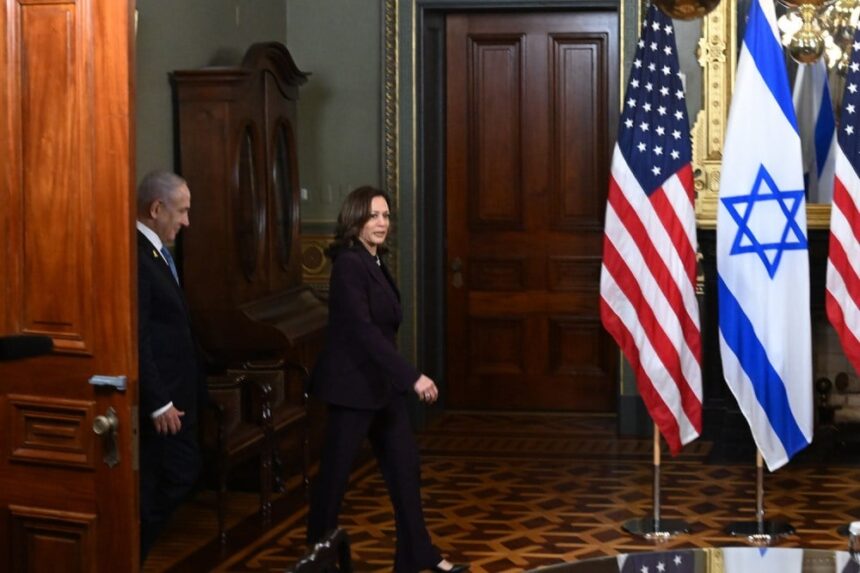Summary by Geopolist | Istanbul Center for Geopolitics:
The article recounts the unsuccessful ceasefire negotiations in Gaza between Israeli Prime Minister Benjamin Netanyahu and Hamas, which were precipitated by significant discrepancies that ultimately led to the collapse of the talks in Cairo. As a result of the uncompromising postures of both parties, expectations for a ceasefire remain low, despite the fact that technical teams are convening in Doha. Netanyahu is under pressure, yet he refuses to withdraw from Gaza or release hostages. Hamas likewise refuses to release hostages despite the devastating consequences of ongoing Israeli bombings, which have resulted in numerous Palestinian casualties.
Domestic political pressures and public opinion, which is growing increasingly critical of Israel’s military operations, are motivating the U.S., particularly under the Biden administration, to advocate for a ceasefire. President Biden suggested a phased ceasefire, which Netanyahu rejected. Discussions are underway, including US actions and recommendations for managing critical conflict zones in Gaza.
Political dynamics in the United States are also influenced by impending elections, with a focus on the Democratic position of Israel and the Palestinians. The Democratic contender, Kamala Harris, offered strong support for Israel’s defence while simultaneously calling for an early ceasefire, demonstrating a nuanced stance aimed at balancing conflicting political forces and public attitudes.
The piece emphasizes the underlying intricacies and divergent interests at work, which include internal Israeli politics, Hamas’ survival concerns, and U.S. election politics, all of which contribute to the prolonged and deadly standoff.
America Is More Desperate for a Cease-Fire Than Israel and Hamas
Last weekend’s negotiations in Cairo for a cease-fire in Gaza collapsed as both Israeli Prime Minister Benjamin Netanyahu and Hamas’s leadership refused to budge on key differences. An Arab official aware of the ongoing negotiations told Foreign Policy that the technical teams are meeting in Doha this week but that he didn’t expect a cease-fire “anytime soon.”
Both sides have been unrelenting. Despite coming under immense pressure from the families of hostages held in Gaza, Netanyahu insists on maintaining the Israeli military presence in Gaza and continuing the military operation against Hamas on the ground. Hamas, on the other hand, is refusing to hand over the hostages even as Palestinians, whose rights it claims to represent and fight for, are struggling to survive the deprivations inflicted by Israel’s incessant bombings. More than 40,000 Palestinians have been killed.
Yet while both Netanyahu and Hamas have made it a habit to walk away from the talks, the United States seems more desperate for a cease-fire and hostage release than either party to the conflict.
Experts say the political imperatives driving Netanyahu and Hamas and the Democratic leadership in the United States are vastly different and partly explain the conundrum.
While Washington wants an end to the killings in Gaza to assuage the concerns of voters at home, Netanyahu is likely waiting for Republican presidential nominee Donald Trump to win in November’s election to have a freer hand in how he handles the conflict. And Hamas wants to make sure that any deal ensures it isn’t exterminated and continues to rule the Gaza Strip.
Joost Hiltermann, the Middle East and North Africa program director for the International Crisis Group, said it is not that Netanyahu or Hamas don’t want a deal but that they want it “only on their terms, which are incompatible.” While Israel doesn’t want any deal that prevents it from continuing the war, Hamas leader Yahya Sinwar wants a complete Israeli withdrawal, returning to the status quo ante prior to the group’s Oct. 7, 2023, assault on Israel.
In contrast, the Biden administration “very much wants a cease-fire based on compromise, given the heightened political sensitivities before the U.S. elections,” Hiltermann said.
According to the latest Gallup poll, conducted in June, more Americans disapprove of Israel’s military action in Gaza than approve, even though public backing for Israel’s military operation has increased slightly since March, and a majority of Democrats and independents still disapprove of it.
The Democrats want—and want to appear to be making an effort—to save Israeli hostages and Palestinian lives, especially as it has a bearing on the vote counts in the five swing states where large communities of Arab Americans reside.
In May, U.S. President Joe Biden announced what he called an “Israeli proposal” split into three phases. In the first, six-week phase, hundreds of Palestinian prisoners would be exchanged for all women, older, and wounded hostages and in the second phase all remaining hostages. If all went to plan, the temporary cease-fire would become the “cessation of hostilities permanently.” In the third phase, reconstruction of Gaza would begin. But Netanyahu was never on board with this plan and never agreed.
Hiltermann said part of the Israeli establishment was willing to countenance the deal on the table—but Netanyahu was not. “This was a gambit to override Netanyahu through Biden’s imprimatur” and the U.N. Security Council endorsement of the “Israeli deal.” But “Netanyahu did not fall for it and successfully called Biden’s bluff.”
Hiltermann is probably right. Foreign Policy has learned that, over the last few months, the defense establishment in Israel has been calling for more flexibility to obtain a deal but there is a growing sense that Netanyahu is blocking it to appease his far-right allies.
A former high-ranking army officer who was until recently engaged in the military operations in Gaza told Foreign Policy that Netanyahu was beholden to far-right leaders Bezalel Smotrich and Itamar Ben-Gvir and was prioritizing Hamas’s defeat over the release of hostages on their behest.
“Netanyahu is speaking in three different languages: one to the Americans, one to families of the hostages, and one to his coalition allies,” the army officer said. “I think he is the truest to his allies.”
U.S. Secretary of State Antony Blinken was shipped off to the Middle East once again this month with a “bridging proposal,” to find a resolution to key sticking points including Netanyahu’s demand to keep Israeli soldiers in the Philadelphi Corridor, a narrow 9-mile stretch of land along Gaza’s southern border with Egypt, and the Netzarim Corridor, which splits the strip into northern and southern zones.
While the details of the bridging proposal have not been revealed, the New York Times reported that a reduced number of soldiers could placate both sides.
Eran Lerman, a former Israeli deputy national security advisor, told Foreign Policy that there was more room for flexibility. “There are two questions: prevent the Philadelphi Corridor from becoming a web of smuggling tunnels once again and prevent armed men in the south of Gaza from going to the north with arms and rockets,” he said. “The defense establishment believes that we can install technical monitoring systems on both corridors, that means no humans, and reserve our right to go back in if we see or sense danger.”
“Earlier, it took much longer, but now with paved roads, the soldiers can be there in 20 minutes,” Lerman added. “Defense authorities say they can handle it.”
The former high-ranking army officer who is aware of the thinking in the defense establishment suggested that Netanyahu was pinning the responsibility of eliminating Hamas on the defense forces while ignoring his own political duty to find or create an alternative to Hamas in Gaza.
The Israel Defense Forces (IDF) have “been telling the government for a while that any military action is only to serve a political plan, but if that’s not developed, then what’s the point? Let’s agree to a cease-fire now and get the hostages back, as long as we can go inside Gaza to carry out raids, if and when needed,” said the army officer.
“Like we do in the West Bank now,” Lerman added.
Jonathan Conricus, a former IDF spokesperson now at the Foundation for Defense of Democracies, told Foreign Policy that wars are not won only by killing the enemy “but by killing the enemy and breaking his will to fight and forging a diplomatic deal to create conditions you want on the ground.”
The differences between Netanyahu and the defense establishment are slowly coming to the fore, while Hamas, too, hasn’t received the kind of backing it hoped for from its allies.
Iran and its militias have struck Israel but not with the ferocity Hamas expected. Hezbollah in Lebanon has regularly carried out strikes in Israel, including an attack last week, yet not strong enough to rattle the Israeli forces. There hasn’t been a regional war, at least not yet, and many of Hamas’s own key leaders have been assassinated. But it is holding out against a deal and hasn’t surrendered as some in Israel expected.
“Hamas is unlikely to agree to Israel’s demand of continuing its presence in Gaza, especially not on the Philadelphi border,” the Arab official aware of the negotiations said. But they will also not leave.
At the Democratic National Convention (DNC) in Chicago last week, one of the most anticipated moments was nominee Kamala Harris’s statements on the Israel-Hamas conflict.
She said she will “always stand up for Israel’s right to defend itself” and always ensure it has the ability to defend itself, implying that she would not cut off weapon supplies. But she also called for an immediate cease-fire. Now is the time, she said, and backed Palestinians’ right to “dignity, security, freedom, and self-determination.”
That is incomparably more than what Palestinians can expect from Trump. In fact, he has threatened to cut off all U.S. aid to Palestinians, expel immigrants who sympathize with Hamas—which activists believe could be misused and used against anyone who supports the Palestinian cause—and extend his Muslim ban to refugees from Gaza. In his last term in office, his solution to the intractable conflict was not support for a two-state solution but Israeli rapprochement with Saudis.
Even though he has warned Israel to “finish up” and “get the job done” as it loses the battle of global perception, or the “PR war,” as he described it, his call for peace appears to be more a reflection of growing opposition in the United States to the Israeli military campaign in Gaza—that goes against the incumbent Democratic Party—and less a marker of genuine empathy for Palestinians’ strife.
Harris may be better than Trump when it comes to offering U.S. support for a two-state solution and protection of the rights of Muslim Americans at large in the United States. Yet her balancing act on Gaza is too reminiscent of Biden’s policy and hasn’t fully succeeded in assuaging the concerns of uncommitted voters.
Michigan is a key swing state and the birthplace of the Uncommitted National Movement—a kind of a mutiny among Democrats to coalesce the protest vote to compel their party to not only achieve a cease-fire but also cut off weapon supplies to Israel.
Abbas Alawieh, a Michigan delegate and one of the leaders of the movement, was quick to express disappointment when a Palestinian was not allowed to address the convention. An Israeli American couple whose son is being held hostage in Gaza spoke at the gathering.
“We didn’t go to the DNC only to request a speaker. We went to push for lifesaving policy change: stop sending the weapons the Israeli govt is using to kill precious Palestinian babies + loved ones,” Alawieh wrote on X on Aug. 23. “DNC chose to discriminate. Their loss. Our movement is growing #NotAnotherBomb.”
By Anchal Vohra
Source: Foreign Policy







